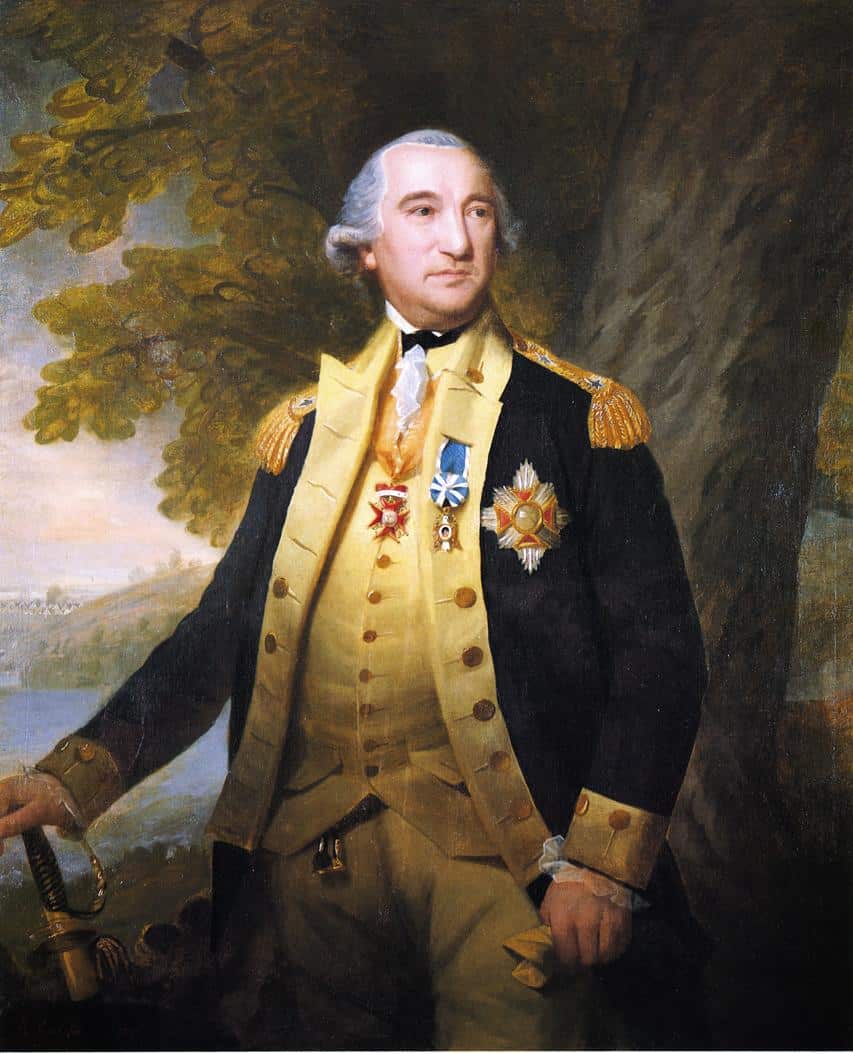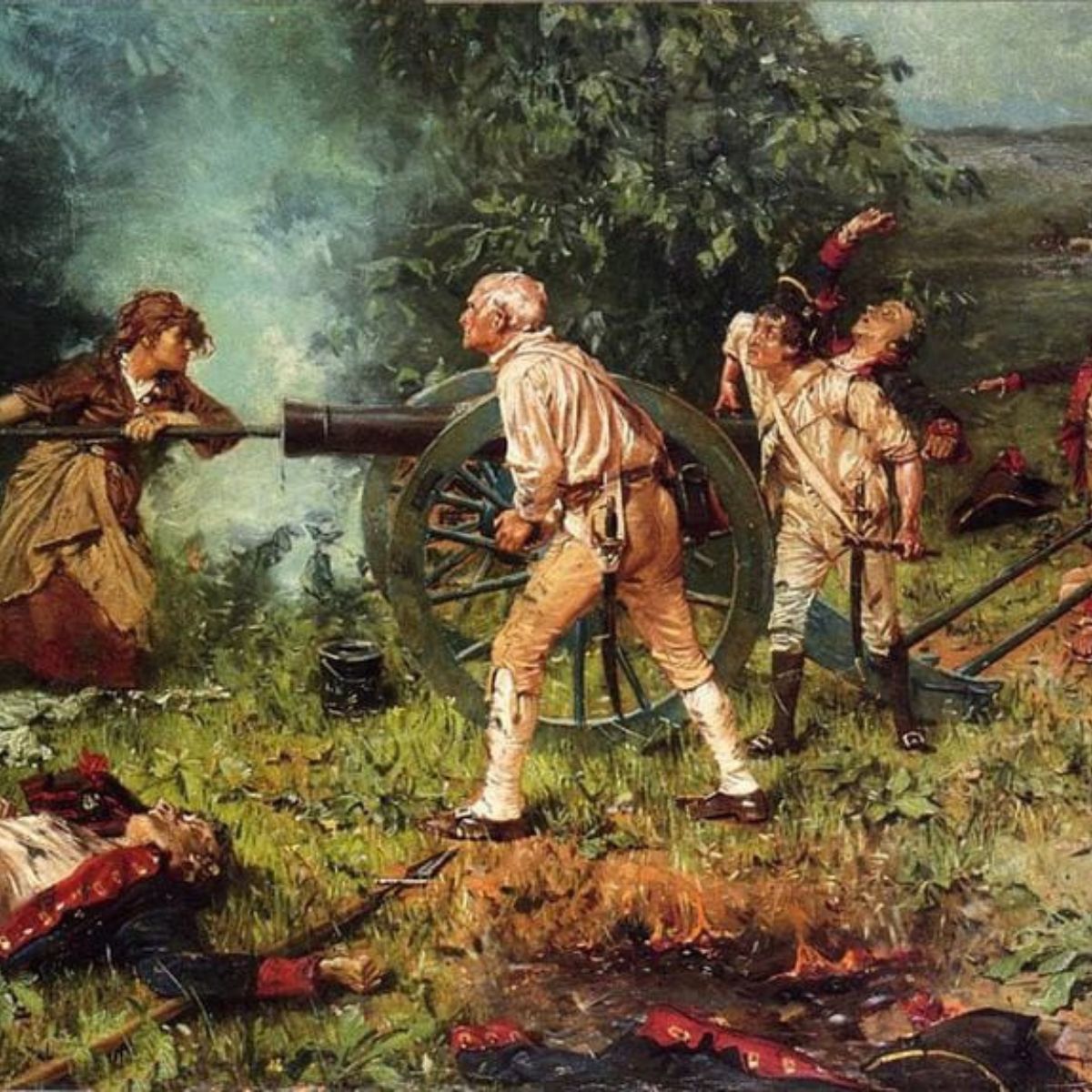Freidrich Wilhelm von Steuben, also referred to as Baron von Steuben was a Prussian and later an American military officer. He served as inspector general and major general of the Continental Army during the American Revolutionary War.
He is credited with being one of the fathers of the Continental Army in teaching them the essentials of military drills, tactics, and disciplines. He wrote Regulations for the Order and Discipline of the Troops of the United States, the book that served as a standard United States drill manual until the Civil War.
He served as General George Washington's chief of staff in the final years of the war.
Jump to:
Baron von Steuben Facts: Early Military Experience
Baron von Steuben was born in the fortress town of Magdeburg on September 17, 1730, the son of Royal Prussian Engineer Capt. Baron Wilhelm von Steuben and his wife, Elizabeth von Jagvodin.
When his father entered the service of Empress Anna, young Friedrich came with him to the Crimea and then to Kronstadt, staying until the Russian war against the Turks under General Burkhard Christoph von Münnich.
In 1740, Steuben's father returned to Prussia, and Friedrich was educated in the garrison towns Neisse and Breslau by Jesuits.
It is said that at age 14, he served as a volunteer with his father in one of the campaigns of the War of the Austrian Succession.
Baron von Steuben joined the Prussian Army at age 17. He served as a second lieutenant during the Seven Years' War in 1756 and was wounded at the 1757 Battle of Prague.
He served as adjutant to the free battalion of General Johann von Mayr and was promoted to first lieutenant in 1759.
In August 1759, he was wounded a second time at the Battle of Kunersdorf. In June 1761, he was appointed deputy quartermaster at the general headquarters. Later that year, he was taken prisoner by the Russians at Treptow.
He subsequently attained the rank of captain and served as aide-de-camp to Frederick the Great; in 1762, he was one of 13 young officers chosen to participate in a special course of instruction delivered by the king himself.
Upon the reduction of the army at the end of the war in 1763, Steuben was one of many officers who found themselves unemployed. Towards the end of his life, Steuben indicated in a letter that "an inconsiderate step and an implacable personal enemy" led to his leaving the Prussian army.
Baron von Steuben Facts: American Revolution
The Continental Army had fought bravely throughout the war, but George Washington wanted an army that would be able to look the enemy in the eye and not run.
The Continental Army continued to shrink at the moment against the British, and Washington was forced to use alternate tactics to frustrate but not defeat the British. Through his channels, he inquired about someone who would be able to train his men.
Baron von Steuben arrived with his Italian greyhound, Azor, his young aide de camp Louis de Pontière, and his entourage arrived at Portsmouth, New Hampshire, on December 1, 1777. They were taken and entertained in Boston and then arrived in Valley Forge.

Washington appointed von Steuben as temporary inspector general. He went out into the camp to talk with the officers and men, inspect their huts, and scrutinize their equipment.
Steuben established standards of sanitation and camp layouts that would still be standard a century and a half later.
There had previously been no set arrangement of tents and huts. Men relieved themselves where they wished, and when an animal died, it was stripped of its meat, and the rest was left to rot where it lay. Steuben laid out a plan to have rows for command, officers, and enlisted men.
Kitchens and latrines were on opposite sides of the camp, with latrines downhill side. There was the familiar arrangement of company and regimental streets.
On May 5, 1778, on General Washington's recommendation, Congress appointed Steuben inspector general of the army, with the rank and pay of major general.
Internal administration had been neglected, and no books had been kept either as to supplies, clothing, or men.
Steuben became aware of the "administrative incompetence, graft, war profiteering" that existed. He enforced the keeping of exact records and strict inspections. His inspections saved the army an estimated loss of five to eight thousand muskets.
Baron von Steuben Facts: The Drillmaster
Steuben picked 120 men from various regiments to form an honor guard for General Washington and used them to demonstrate military training to the rest of the troops.
These men, in turn, trained other personnel at Regimental and Brigade levels. Steuben's eccentric personality greatly enhanced his mystique.
In full military dress uniform, he twice a day trained the soldiers who, at this point, were themselves greatly lacking in proper clothing.
Steuben introduced a system of progressive training, beginning with the school of the soldier, with and without arms, and going through the school of the regiment.
This corrected the previous policy of simply assigning personnel to regiments. Each company commander was made responsible for the training of new men, but actual instruction was done by sergeants specifically selected for being the best obtainable.
In the earlier part of the war, the U.S. used the bayonet mostly as a cooking skewer or tool rather than as a fighting instrument.
Steuben's introduction of effective bayonet charges became crucial. In the Battle of Stony Point, U.S. soldiers attacked with unloaded muskets and won the battle solely on Steuben's bayonet training.
The first results of Steuben's training were in evidence at the Battle of Barren Hill on May 20, 1778, and then again at the Battle of Monmouth in June 1778.

Steuben, by then serving in Washington's headquarters, was the first to determine that the enemy was heading for Monmouth.
During the winter of 1778–1779, Steuben prepared Regulations for the Order and Discipline of the Troops of the United States, commonly known as the "Blue Book." Its basis was the training plan he had devised at Valley Forge.
It was used by the United States Army until 1814 and affected U.S. drills and tactics until the Mexican War of 1846.
Steuben continued to have a strong presence in the Revolution after Valley Forge. He served in the Southern Campaign, and his influence was continually sought.
He helped with the organization of defense, logistics, and offensive maneuvers until he had to take sick leave.
Baron Von Steuben Facts: Legacy
In 1784, Baron Von Steuben became an American citizen. He settled in New York and would die in America. He is one of the forgotten heroes of the revolution by the common person.
There are holidays, cities, corporations, non-profit organizations, and many other things that bear his name.
Baron Von Steuben Facts: Online Resource
- Wikipedia - Baron Von Steuben
- National Park Service - Von Steuben
- All Things Liberty - Impact of Baron Von Steuben
- Find A Grave - Friedrich Wilhelm von Steuben
- The Drillmaster of Valley Forge: The Baron de Steuben and the Making of the American Army
- The History Junkie's Guide to American Revolutionary War
- The History Junkie's Guide to Revolutionary War Generals
- The History Junkie's Guide to American Revolutionary War Timeline
